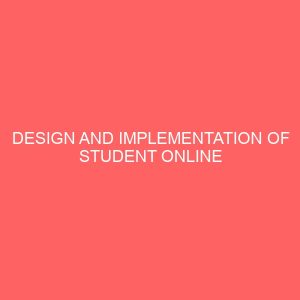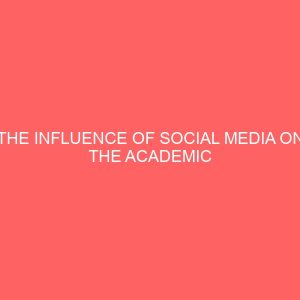Description
CHAPTER ONE
INTRODUCTION
Background of the Study
This project is on Assessment of productive skill competency levels based on gender among senior secondary school chemistry students for entrepreneurship. Entrepreneurship has become a topic of interest in the world today. Globally, there is a growing emphasis on encouraging entrepreneurship and innovation as a means of fostering economic growth. The development of entrepreneurial skills and knowledge is a priority for governments that want to encourage a creative and enterprising society (Roslyn; Atchison & Brooks, 2008). Entrepreneurship has been identified as a mechanism by which private and public establishments generate social returns in terms of economic growth and job creation (Acs, 2004; Audretsch, 2006). Entrepreneurship is a process of vision, change and creation. It requires application of energy and passion to the creation and implementation of new ideas and creative solutions.
The essential ingredients of entrepreneurship include the willingness to take calculated risk – in terms of time, equity, or career, the ability to formulate an effective venture team, the creative skills to marshal needed resources, fundamental skills of building solid business plans and finally, the vision to recognize opportunities where others see chaos, contradictions and confusion (Kurato & Hodgetts, 2004). Frequently the notion of entrepreneurship is associated with predominant characteristics such as creativity and imagination, self determination, and the ability to make judgmental decisions while coordinating resources (Henderson & Robertson, 1999).
Entrepreneurship has emerged over the last two decades as arguably the most potent economic force the world has ever experienced, with that expansion has come a similar increase in the field of entrepreneurship education. The recent growth and development in the curricular and programmes devoted to entrepreneurship and new-venture creation have been remarkable. In Nigeria, the need for entrepreneurship generation among the citizenry has led to the frequent change of the curricula and system of education in view of making the populace self-reliant. The United States of America has achieved its highest economic performance during the last 10 years by fostering and promoting entrepreneurial activity (Minniti & Bygrave, 2004). In Indonesia, entrepreneurship development is a current important issue related to the economic development (Tulus, 2007). In Australia, especially over the past decade, there have been strong recommendations from the federal government for education providers to develop more academic programmes for the development of the entrepreneurial capacities of future Australian youths (Roslyn, Atchison & Brooks, 2008). In 2000, the Australian National Innovation Summit called for greater integration of entrepreneurial skills development into the education system (Roslyn et al 2008). In UK, successive governments have increasingly stressed the need for more enterprising society. Much of the emphasis has been placed upon educationalists to introduce more elements of enterprise into the school curriculum at all levels (Brian & Norma, 2006). Bulgaria and other countries in Central and Eastern Europe (CEE) over the last twenty years have experienced profound reforms aimed at the democratization of society and the liberalization of the economy that resulted in the formation of the private business sector and the introduction of the entrepreneurial class (Desislava, 2011).
Entrepreneurship is considered an important factor for the transition from centrally – planned to market economy (McMillian & Woodruff, 2001). Hisrich (2001) listed the following as skills required in entrepreneurship: technical skills, business management skill, and inter-personal skills. According to Adidu and Olanye (2006) entrepreneurial skills are categorized into personal skills, interpersonal skills, critical and creative thinking skills and practical skills. The technical skills are the practical abilities one needs in order to produce the needed products or provide the required services. The technical skills are acquired through study, and after years of experience and practice.
Entrepreneurial education is therefore a programme that inculcates creative, innovative, managerial and productive skills needed in business enterprises for self reliance and consequently in national development. It seeks to produce male and female students with knowledge, motivation and skills to encourage entrepreneurial success in a variety of setting. It focuses on the realization of opportunity and is a pragmatic and viable approach to stimulating national development and fostering the transformation of a nation (Eke, Igwesi & Orji,2011). Through entrepreneurship education, young people learn organizational skills, including time management, leadership development, interpersonal and productive skills, all of which are highly transferable skills sought by employers. Real development involves the capacity and creative capacity of a people to transform effectively, the natural resources of their environment into goods and services through their creative talent and productive workforce, given the widely accepted notion that entrepreneurial ventures are the key to innovation, effective competition and productivity (Plaschka &Welch, 1990). The goal of education therefore is entrepreneurship (Iyekekpolor, 2007), that is, production of an individual who is self-reliant, and an employer of labour.
A self-reliant person is a resourceful and enterprising person no matter the gender; he is full of initiative and good at problem-solving, especially in difficult situations (Encartar Dictionaries, 2009). From the above, being self-reliant is being productive. Being productive needs skills and competencies. Skill is the ability to do something well; usually gained through training or experience (Encarta Dictionaries, 2009). Productive skill are those skills which when acquired enables an individual to be self reliant. Productive skill acquisition in Nigerian secondary education level is meant to give the students some level of income generating skills. Mbionwu (2008) noted that when youths are given training in productive skills, they can be self-employed after schooling; hence they become active partners in both community and national development.
Ihebereme (2010) noted that effective training of students in productive skill acquisition provides a platform for technological excellence in the face of the globalization of the world economy. The educational system of every country must have set goals relevant to the citizens’ needs and national aspirations. The major task of such goals lies in its ability to ignite the latent talents in its citizens particularly youths, prepare and thoroughly equip them with relevant knowledge and skills for viable functionality to cope with any intellectual or cultural changes which the rapidly changing environment may demand in future (FRN, 2004).
Employment requirement in most establishments are changing everyday due to technological impact (Ottah, 2008). As such the educational system is expected to equip consumers of education with the required self- reliant/productive skills. Consequently, the possession of productive skill is important in preventing youths from becoming social misfits. For instance, a graduate of secondary school chemistry education can be gainfully employed as a result of productive skills acquired while in school. According to Eya (2009), the perennial unemployment problems of school leavers in Nigeria is one of the variables that is rendering the education of youths hopeless and thus dampening the interest of the youths in academic pursuits. This is because it seems to lack functionality and focus. The National Policy of Education, documented among other aspirations that the Nigerian secondary education is expected to:
- Provide entrepreneurial, technical and vocational job specific skills for self-reliance, and for agricultural, industrial, commercial and economic development.
- Inspire students with a desire for self-improvement and achievement of excellence (FRN, 2004).
The listed national aspirations can only be achieved through entrepreneurship education incorporated into professional knowledge. Such education is essential for socio-economic and industrial development.
The greatest worry of any growing nation the world over, especially those in developing economies like Nigeria, is how to fully utilize education to develop peoples’ ability to manage and induce change or how to improve the standard of living of her citizenry and effect national development. Education is seen as the chief agent for training the young for competent adult role performance and for socialization. It is for this reason that Nigeria in her National Policy on Education (FRN,2004) conceived that some enduring objectives like achieving a self-reliant nation, building a great and dynamic economy be channeled towards achieving self-reliance, effective citizenry, efficiency and national consciousness through the education system.
The problem with the present day youths seems to be their inability to create jobs and be self employed. Consequently, many youths seem to have lost focus of the future and this has left them incapacitated in many ways. They seem not able to fit into the society the way they should. Certainly, the nexus between educational institutions and industries allows youths, especially students, to explore the opportunities of self – employment through direct involvement in some ventures which help in inculcating entrepreneurial skills. It is necessary that youths be given the opportunity to actualize their creative potentials through exploring this nexus. This is where science education comes in.
Science education has a lot to contribute in equipping youths for entrepreneurship. Following Education for All (EFA) and the Millennium Development Goals (MDG), and subsequent development and adoption of a National Economic Empowerment and Development Strategies (NEEDS), it became imperative to update contemporary needs of the nation as a country aspiring to become one of the top 20 economies in the world by the year 2020. For any country to survive technologically, it must have science background. The education associated with science will therefore; enable the learners to exert their maximal efforts in the bid to tame their environment. Science teaching serves as a springboard to professions like pharmacy, engineering, dentistry, medicine, such science background includes all the principles, theories, and process skills. Science education deals with the technical skill aspects of entrepreneurial skill. Chemistry as a subject is one of the platforms with which this can be achieved. The power of chemical science is what creates as a whole, an enabling infrastructure that delivers the food, machines and materials that are the hallmarks of modern life (Samuel, 2008). Hence it is at the core of every technology that is enjoyed today.
Chemistry as a physical science is the study of the material substances that occur on earth and elsewhere in the universe. It is concerned with the utilization of natural substances and the creation of artificial ones like ionized water, plastics, perfumes, creams, lotions, food drinks, etc. Studying chemistry helps in the understanding of how materials behave, whether they are in the kitchen, in ones clothes or in a builder’s yard. It helps one to understand how to make better materials, how to get the energy that is needed and how to protect the environment. Chemistry involves process skills which are mental tools used in discovering and acquiring of scientific knowledge. It is conversion, making, process, production, rebirth, transfiguration (Roget, 2003).
The science process skills (SPS) are defined as a set of broadly transferable abilities, appropriate to many science disciplines and reflective of the behavior of scientist (Okebukola, 1990). Science process skill is an ability that can be developed by experience in carrying out mental operations and physical actions. It means that science process skills could be applied to various activities in nature irrespective of the subject in science. The relevance of science process skills to the study of science and manufacture of new product cannot be over emphasized. Okebukola (1990) stated that progress in the world of inventions and innovation is predicted on the ability to use the science process skills. Indeed he made it clear that no major contribution to knowledge or inventions of new products is possible if the scientist fails to acquire and develop the science process skills. In recognition of the usefulness of science process skills, the Federal Government of Nigeria incorporated students’ mastery of the science process skills as objectives of the science curricular for primary and secondary schools. Science Process skills in science (chemistry) when acquired culminate in productive skills/ abilities in any endeavour.
The science process skills include: observing, classifying, measuring, counting numbers, recording, communicating, predicting, formulating hypothesis, inferring, experimenting, researching, and interpreting of data, controlling variable, and generalizing. The use of these science process skills (SPS) over a period of time leads to an accumulation of scientific knowledge inform of scientific practices, laws, principles and theories, all of which constitute the products of science. Development of these SPS leads to acquisition of the production skills that successful entrepreneurs tend to use to start and sustain their ventures. An entrepreneur must be creative. This means that he/ she must be able to observe/ identify a problem and proffer solutions to the problem, as well as create wealth through the solution. To be creative, the entrepreneur applies a combination of skills such as observing events/occurrences, interpreting events/occurrences, formulating hypothesis, identifying and controlling variables and also involve in communicating his observations. The entrepreneur seeks solution to problems and by doing this, he formulates hypothesis as solutions to the problem and experiments with the hypothesis in order to create wealth.
He needs to communicate with the populace what he can do and/or does in order to impress them to patronize his ventures. Research has shown that the skills of an entrepreneur includes creative thinking, planning and research, decision making, organization, communication, marketing, record keeping and business management. These skills are subsumed in the science process skills. Therefore, for the problem of unemployment, it is expected that science education, chemistry education in particular, among others should help to ameliorate the situation since science is life and the bedrock of societal growth and transformation. This can be actualized through adequate teaching methods, strategies and practices. Selecting entrepreneurial skills for a particular concept for classroom lesson delivery is an important aspect of teachers’ lesson plans that can help to effectively integrate skills that heighten students’ interest towards productivity. With the chemistry curriculum in the senior secondary school, it is possible for the chemistry teacher to teach chemistry in a way that the students will see the usefulness of chemistry and how they can utilize the knowledge and skills acquired for gainful employment in the society. To produce job creators, there is the need to infuse the spirit of entrepreneurship into the mode of instruction by science teacher (chemistry in particular) which will facilitate the emergence of entrepreneurial chemistry students.
The teaching of chemistry plays a major role in the study of chemistry. The teaching profession in Nigeria has been recognized by all stakeholders as an important profession for the development of every society. The government, through the National Policy on Education has clearly stated that “teacher education will continue to be given major emphasis in all our educational planning” because “No education system can arise above the quality of its teachers” (FRN, 2004, p. 38). What learners learn is greatly influenced by how they are taught. For learners to develop productive or entrepreneurial skills, chemistry teachers ought to have adequate theoretical and practical knowledge as well as pedagogical content knowledge (PCK) of the subject. The decision about content and activities that teachers make, their interaction with students, the selection of the assessment, the habits that teachers demonstrate and nurture in their students and the attitudes conveyed, affect the knowledge, understanding, ability and attitudes that students develop towards any subject matter or skill. One may ask whether the chemistry teachers in the senior secondary school have this in focus while teaching their students.
The acquisition of professional qualification in chemistry is expected to equip an individual with some productive skills for self employment through proper grounding in entrepreneurial and/or productive skills. Functional chemistry education emphasizes applicability or transferability of the knowledge of chemistry to the immediate environment whether urban or rural. Piaget (1972) has contributed immensely on the influence of environment on cognitive development. Contribution of Piaget to the understanding of how the environment helps in the intellectual development and acquisition of skills can be stressed as Piaget has helped in the present view of intelligence as a cumulative building up of more complex and flexible experience, what he called “schemata”. Piaget stressed that the formation of operations always requires a favourable environment for operations carried out by both boys and girls. One may wonder about, what influence has gender on the acquisition of skills? Does it enhance or retard skill acquisition in chemistry?
The purpose of chemistry education as stated in the National Chemistry Curriculum (FRN, 2011, P.1) is “Acquisition of the appropriate skill and development of mental, physical and social abilities and competencies that contributes to the development of society”. Consequently, chemistry education, should aim at equipping an individual irrespective of gender to be self-reliant. But is it performing that function in the Nigerian secondary school system today? From the introduction of the science subjects into school curriculum in the 50s, 60s, 70s, the notion is that engineering, medicine, pharmacy, survey, architecture are masculine disciplines(Nwana,2009). This notion edged the females out in the pursuit of sciences. Could it be that this is still the case today?
Statement of the Problem
Nigeria is getting saturated with young graduates of various disciplines that are unemployed. The numbers of young graduates produced from Nigerian Universities yearly, are so many that absorbing them into the existing labour market has become an uphill task. According to Fayemi (2007), unemployment has assumed serious dimensions in recent times and therefore needs urgent attention. He further stated that Nigerian contemporary graduates are said not to be well prepared to meet the challenges of participation in the private sector that is becoming the dominant sector in the Nigerian economy. In his opinion, Ogunleye(2007) stated that the introduction of entrepreneurship education into the science curriculum could lead to a continuous and sustainable technological growth of the country. In view of this fact, development of a science based entrepreneurship education should receive serious attention among Nigerian policy makers and curriculum planners. Olayiwola and Adedibu (2006) observed that there is a missing link in the selection and application of resources for meaningful development of entrepreneurial skills.
The problem of insufficient acquisition of science process skills (SPS) appears to have been receiving “snail speed” attention from the concerned educators and this has propelled the researcher to embark on the topic whose problem is to assess the extent of the acquisition of productive skills for entrepreneurship among SS3 chemistry students in Anambra state. Acknowledging the various contents in senior secondary school (SSS) chemistry curriculum which would lead students to be self-reliant, it has become necessary to assess the productive skill competence of the secondary school leavers to ascertain their level of acquisition of the skills.
Purpose of the Study
The main purpose of the study was to determine the extent of productive skill competence of senior secondary school chemistry students for entrepreneurial development and self-reliance. Specifically, the study sought to examine:
- The level of productive skills possessed by the senior secondary (SS3) chemistry
- The level of observing skills competence of male and female SS3 chemistry students in the
- The level of communicating skills competence of male and female SS3 chemistry students in the
- The level of inferring skills competence of male and female SS3 chemistry students in the
- The extent of measuring skills competence of male and female SS3 chemistry students in the state
- The extent of experimenting skills competence of male and female SS3 chemistry students in the
- The level of manipulating skills competence of male and female SS3 chemistry students in the
- The level of formulating hypothesis skill competence of male and female chemistry students in the
- The level of interpreting skills competence of male and female SS3 chemistry students in the
- The level of identifying and controlling variable skill competence of male and female chemistry students in the
Significance of the Study
The findings of this study will likely be significant to the nation, curriculum planners, and officials of ministry of education, science (chemistry) teachers, and students. The nation will achieve her aspirations for her secondary education which is to provide entrepreneurial, technical and vocational job specific skills for self-reliance, and for agricultural, industrial, commercial and economic development (FRN, 2004), as curriculum planners, officials of ministry of education, science (chemistry) teachers became aware of the various entrepreneurship skills that can be inculcated in the chemistry curriculum in the secondary school. This would in turn inspire students with a desire for self-improvement and achievement of excellence. Schools remain the most effective and efficient way to transmit skills, knowledge, values and attitudes that are needed for full human development (UNICEF, 2002) and invariably a gradual halt to unemployment.
Curriculum planners may be armed with proper information available which will enable them to find out if there is a need to modify the learning experiences provided to student and identify if the present learning experiences is providing progress in terms of skills acquisition. It will also encourage the curriculum planners to outline the ways to actualize the objectives of the National Policy on Education (NPE) especially as it relates to developing job- specific skills for self-reliance, for industrial, commercial and economic development. It is expected that with such inputs the chemistry curriculum of the future, would produce graduates from Nigerian secondary schools, who would be relevant and effective in the emerging global village, and who are capable of competing with their equals anywhere in the world.
The findings of the study can be of use to the officials of Ministry of Education for the fact that they can organize conferences, workshop or seminars for the chemistry teachers to afford them in-service training in the needed areas. They would have an increased and empirically established repertoire of skills to watch out for during inspections and supervision programmes. They would encourage exhibitions of the students’ products as this will encourage perfection of the entrepreneurial skills inculcated in them by their teachers.
Furthermore the findings of this study will likely be of use to the chemistry teachers in that they will see the need to link classroom instruction to everyday life and self-reliance so as to facilitate entrepreneurial chemistry students. The chemistry teachers would employ excursions to industries, giving of projects to students, provision of suitable classroom environment that would promote entrepreneurship in their teaching methods in order to give the students the opportunity to exercise the SPS they have learnt. The chemistry teacher classroom instructions will also adjust towards applicability to real life, if they pay more focused attention to concepts and skills, which the findings of this study will highlight.
The students are not left out, they will probably benefit from the findings of this study as the teachers link chemistry teaching to industrial/productive skills, the students develops entrepreneurial/ self- reliant skills that gives them self-employment as they leave school. Senior secondary school graduates will have the opportunity of knowing and seeing the practical relevance and use of the chemistry concepts and skills that are taught in the classroom. This would no doubt, promote a lot of understanding of the topics and motivate students to develop the much needed interest in chemistry.
This study will also be theoretically significant in that it will show that there is possibility of acquisition of productive skills through stages of development and that constant practice aids a student to retain expertise on a given task.
Empirical data that arise from this study would add to the body of knowledge in the area of skill acquisition and acquisition of science process skills by secondary school science (chemistry) students for entrepreneurship, which is a topical issue in today’s world. It will either support or otherwise dispute the findings elsewhere that science students do not acquire science process skills in school.
Finally, to future researchers especially from Nigerian environment, who may want to identify the process skills inherent in certain curricula material, determine the level of acquisition of science process skill in a particular unit, or establish science process skill competence by chemistry students, it is hoped that the findings of this study will offer knowledge that serve as reference material
Scope of the Study
The scope of this study was delimited to only the productive/process skills which are observing, measuring, experimenting, interpreting data, formulating hypotheses, controlling variables, communicating, inferring, manipulating skills that enhance entrepreneurial development in secondary school chemistry, acquisition and development of these skills in the Nigerian youths. The SS3 Chemistry students of 2011/2012 session in Anambra state who registered for the senior school certificate examination (SSCE) by NECO and WAEC were used. All the public secondary schools in the six education zones in Anambra State were used in the study. The zones are Aguata, Awka, Nnewi, Ogidi, Onitsha, and Otuocha.
Research Questions: The following research questions guided the study.
- What is the level of productive skill competence of senior secondary school chemistry students for entrepreneurship?
- What is the competency level of SS3 chemistry students on observing skills based on gender?
- What is the competency level of SS3 chemistry students on communicating skills based on gender?
- What is the competency level of SS3 chemistry students on inferring skills based on gender?
- What is the competency level of SS3 chemistry students on measuring skills based on gender?
- What is the competency level of SS3 chemistry students on experimenting skills based on gender?
- What is the competency level of SS3 chemistry students on manipulating skills based on gender?
- What is the competency level of SS3 chemistry students on formulating hypotheses skills based on gender?
- What is the competency level of SS3 chemistry students on interpreting skills based on gender?
- What is the competency level of SS3 chemistry students on identifying and controlling variables skills based on gender?
Hypotheses: the following hypotheses were tested at 0.05 level of significance.
- There is no significant difference between the mean scores of productive skills acquisition of SS3 chemistry
- There is no significant difference between the mean scores of observing skills competence of SS3 chemistry
- There is no significant difference between the mean scores of communicating skills competence of SS3 chemistry
- There is no significant difference between the mean scores of inferring skills of SS3 chemistry
- There is no significant difference between the mean scores of measuring skills of SS3 chemistry
- There is no significant difference between the mean scores of experimenting skills competence of SS3 chemistry
- There is no significant difference between the mean scores of manipulating skills of SS3 chemistry
- There is no significant difference between the mean scores of formulating hypotheses skills competence of SS3 chemistry
- There is no significant difference between the mean scores of interpreting skills competence of SS3 chemistry
- There is no significant difference between the mean scores of identifying and controlling variable skills competence of SS3 chemistry








Reviews
There are no reviews yet.